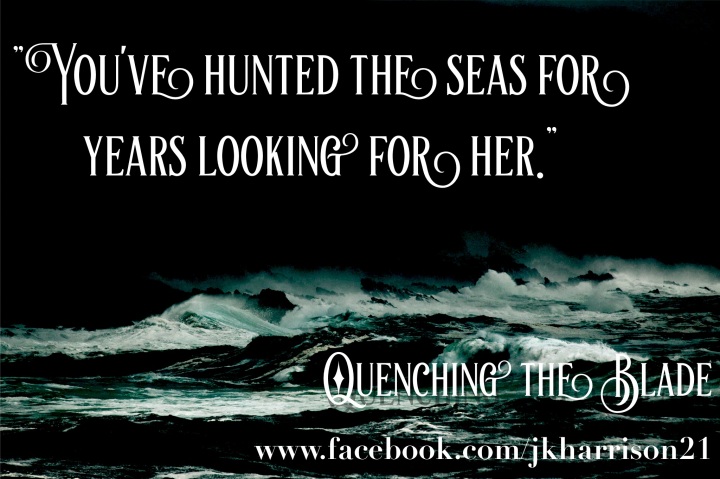In recent days, there appears to be a growing interest in presenting historical realism into fantasy writing. If that’s not your bag then that’s absolutely cool. This blog is aimed at those who wan…
Source: That is not a broadsword!
In recent days, there appears to be a growing interest in presenting historical realism into fantasy writing. If that’s not your bag then that’s absolutely cool. This blog is aimed at those who wan…
Source: That is not a broadsword!
An excerpt from Quenching the Blade, book two of The Forging Legends.
“You’re pretty good with those.” Milo’s voice noted behind me.
“I’m very good with these.”
“You were very good in the match tonight, too.” He dropped down into the sand next to me.
“I lost, if you weren’t paying attention.” I threw another knife, the soft ‘thwap’ of it embedding in the wood less satisfying than usual.
“No one bests the captain with the sword.” Milo grinned. “You lasted longer than anyone else ever has. It was a good match. He taught you, didn’t he? The captain?”
I nodded and poured more rhum into my mouth, wishing it would sear my mind as quickly as my tongue. All my knives protruded from the post now, and I was too drunk to retrieve them again.
Milo rose unbidden to get them. “Your skill with the knives looks equal to your sword.” He handled the slender blades carefully has he handed them back to me.
“My skill with these knives is better . Your captain cannot compete with me there.”
“No?” He looked ridiculously awestruck by that idea.
I leaned back to drink more rhum. Oddly, over half-empty now, the jug felt heavier. “No one can compete with my knife skills.” I threw another knife into the wood.
Smoke drifted from the nearest bonfire, wrapping us in a hazy shroud while the moon traced it’s path above us. Milo watched me without saying anything, content to retrieve my knives again and again.
Draining the last of the rhum, the clay jug banged into my teeth, but the spicy drink and caustic smoke did their part to numb my face so I didn’t feel it.
“Have you killed people with these knives?” He broke the quiet, examining the naked steel of one knife in the fire’s glow behind us.
“Yes.” I took it and flung it into the wood again. The sound was softer now, the wood pulpy from its abuse tonight. “I’ve killed people with all my weapons, and with borrowed weapons, and stolen weapons, and no weapon at all.”
Milo stared at me, dark eyes wide, without saying anything.
I scowled at his expression. “But they all wanted to kill me first.”

This is an excerpt from Of Fire and Steel, book one of The Forging Legends.
“Always war. You men and wars. Too much like the gods.”
Song frowned at the twisting smoke. “We didn’t ask to be attacked.” And he didn’t ask to be the Vhyth, Kat hadn’t asked to be the Ancarlia. No one asked for any of this.
“Not this time. But it is all you men do. War, killing, destruction. Yet, it is you the gods left the land to.”
“We did not betray them. Dragons chose their side and they lost.”
“We chose no side.” The voice hissed, the smoke turning acrid. “We simply…took no interest. We cared nothing for the struggle of power among the gods, it was only the land we wanted. We loved the land as you take life-mates. It breathed, it woke and slept. It sang—our ears heard the song. And the sun, the vyran, the fire-heart in all it’s flaming glory, blessed us.” The voice took on the tone of speaking of a lover. “But the gods were angry. They weighed the act of nothing the same as the act of wrong. And now we are bound to take part. So here you stand.”
Song straightened.
“I cannot see that there is any right or wrong in your wars. They are all the same. It is as though you will reenact the weakness of the gods again and again for all of time.”
“You deny the wisdom of the gods?” The words came out before Song could measure them.
“Our magic is very old. We have known the gods a long time.”
But they were the gods. They created everything, ruled everything. Their rule is what banished the dragons below the earth and away from the sun they loved so. Song didn’t know how to say this aloud, though. “History has shown us the wisdom of the gods—“
“Our histories are longer than yours. Come. Your trials are only beginning.”

This is from Quenching the Blade, book two of The Forging Legends.
“I’d offer to buy you a drink, but I see you’ve taken care of that yourself.” He loomed over my chair, studying me to see how the half bottle of drink affected my senses. He would be disappointed. “I’ve yet to see you in person up until now. Heard you were small, but…I pictured you a little taller.”
Maintaining my silence, I offered him a cool look. This big, bearded man did not come to buy me a drink, nor did he come to make accusations. That meant he came for something worse.
“Drinking alone? More than one person has put a price out on your head, wouldn’t think you’d want to drink alone.” He shifted to block any exit.
Ah. The prices on my head were something of common rumors, but not the sort of thing people talked about so openly, unless, of course, they wanted to collect one. I appraised him again. He was a big man and it would be a huge mess to deal with him here. It would be nice if I could prove to my friends that I could make it through an evening in a tavern without a riot in my wake.
“Mayhap you’re right.” I ceded as I pushed back from the table to stand. Perhaps I could make it past him and out into the night without a scene.
“Here.” Before I could protest or reject him, he clasped a wide hand around my wrist as though to help me rise.
Something pricked into the soft flesh on the underside of my arm. In the same moment, my magic felt the poison spreading under my skin.
I smiled my thanks, slipping a dagger free. As I straightened, I shoved the blade between two ribs, into his heart. The muscle clenched around the foreign object once and then his weight slouched into me. He smelled like soap and horse sweat. Twisting as I pulled the dagger free, I shifted so the dead man sank into my chair. I wiped the blade on his cloak, letting the fabric fall to conceal the dark stain spreading over his shirt. Sweeping a look over the tavern, everyone was drinking and talking as before. No one noticed our exchange. The lamplight grew brighter and the faces before me blurred.
Pushing through the throng of patrons, I fought my way out to the crisp night air—I had to get away from the smell of sweat, drink, and tavern food. Pulling clean air in through my nose, I caught myself on my knees, fighting back the urge to vomit. Gritting my teeth on a curse, I waited for my magic to finish off whatever that man put into my arm.

This week’s excerpt is from Of Fire and Steel, book one of The Forging Legends.
Water woke me, not the feeling of drowning this time, but the way my back screamed as rivulets trickled over it. That scream moved to my mouth, ripping raggedly from a throat swollen and raw.
“Look, look, Ancarlia. You see, yes?” Shenab’s smiling face bobbed before me again.
I didn’t answer but he watched the focus of my one good eye with his, and seemed satisfied I was looking. He held something up to me.
“We call our criminals vishori.” He forced his mouth around the unfamiliar sounds of Esponian. “We mark them with a V so we all will know. I have this for you, do you see? It is a D, a D for doiya.”
He held up a D-shaped piece of metal—a brand. The word fought its way through the haze of my mind.
Shenab walked away from me then, a small smile playing with his full mouth. My back screamed again, told me it could not bare this pain, told me it was too much. My healing surged again, only to be pushed back. The room spun and faded before me, twinkled senselessly, and I closed my eye against it. My ribs throbbed and my shoulders ached. The darkness tugged at me again, but that back part of my mind was insistent, almost frenzied, that I needed to focus, to pay attention.
Other parts of my mind flicked to alertness, fought back the dizziness and pain. Fear became a cold tickle down the inside of my spine that spread out, up, through every part of me until I became wide awake and choking with it. Tears pricked at my eyes and rolled over bitten, bloody lips that began working out silent prayers becoming pleas. Pleas for Seven and Song, for my mother and father, supplications to be saved from this, from more than I could possibly bear.

He stood as we came in, unfolding a lean body swathed in shades of the sea, to tower over everyone else in the room. Silver streaked through the dark tangles about his face, but he seemed ageless. And his eyes…ah, Ashta, his eyes. They were black and bottomless, a glimpse and I could feel myself slipping into the insanity inside.
“You have something for me, do you?” The Sorcerer peered past Tylen to me.
“Something you’ve been looking for.” Tylen tugged me forward to display before this insane man.
Bile rose in the back of my throat.
“All powerful Arghast.” The Sorcerer’s voice wisped like wind through grass. “Can it…?” He looked back to Tylen and his face smoothed to caution. “What is it you want for this?”
“Unlimited passage.”
The Sorcerer looked Tylen over like he was preparing to settle into a negotiation, but his eyes kept tugging back to me, giving away his weakness.
“Where is your sword?” He asked Tylen rather than counter his request.
My heart, already pounding in my ears and choking me at the back of my throat, leapt into a frenzy. Hepteta had that cursed sword. How could we overlook something so vital? People had been quick to notice when it rested on my hip.
“Something like this does not come to me without sacrifice.” Tylen answered easily.
The Sorcerer might have laughed, it was a strange rattling sound. “I will not give unlimited passage, even for her. You’ve always been an ambitious man, but lets be reasonable. I’ll give you one trip through the strait with no restrictions or taxes.”
“One trip?” Tylen scoffed. “No, you’ve hunted the seas for years looking for her. Let me take three ships through—once. No taxes, no restrictions, no harassments by your ships.”
The Sorcerer’s black eyes studied me hungrily, as though he’d already forgotten Tylen still stood before him. “Are you ready to go through with the three ships now?”
“I’m not foolish enough to leave her here and attempt to return.”
The Sorcerer’s laugh was unmistakable this time. It echoed hauntingly of waves crashing on rock.
“You can see them waiting.” Tylen gestured to the windows.
“Three ships, one passage with all the cargo you can carry.” The Sorcerer agreed, his hands twitching with eagerness in his robes.
My chain changed hands. Tylen held my gaze for a brief moment as he left me, and then I was alone with the Sorcerer and a handful of guards, this insane man clutching my chain.
“There have been many stories about you, calling you many, many things.” He caressed my face with cold fingers, oblivious to my cringe. “Not all those stories could possibly be true, I know, but I feel you. I feel how your magic calls out to mine.”
Every week, I share an excerpt from my WIP series, The Forging Legends, on my Facebook page. I’ve decided to start doing the same on here. This week it’s from the second book in the series, Quenching the Blade.
“They look official.” Max noted.
“Mm.”
People scurried, scattering out of the way of these men. They walked with swift, sure steps, backs arched and eyes scanning everything. The slender man was with them wearing a smug look as they approached where we waited. He held his broken nose gingerly, eyes livid as they looked out over his hand, finding me.
The official men with red sashes examined us as they came to a stop. I watched their eyes flick to the hilts over our shoulders, the jewel in my chest, the daggers at our hips and finally the gaudy sword at my side.
“Give us the sword.” Despite being the slightest man before us, he spoke in a tone secure in being obeyed.
“Which sword do you want?” Max asked. “We have five between us.” He reached back to unsheathe both of his.
I kept my hands carefully at my sides and smirked.
“We want the girl’s sword.” The small man demanded in thickly accented Esponian.
“She’s not likely to give up any of hers. You can have one of mine for a price.”
The short man’s dark eyes snapped to Max then came back to me. “We’ve no interest in the games of strangers. The sword does not belong to you.”
“Then how is it I have it and you do not? It seems to me if it was your sword, you’d have it on your belt.”
“Insolent.” He sneered. “You know nothing of that thing.”
“Mayhap. Mayhap not.” I shrugged carelessly. “I’ll tell you as I told him.” I nodded to the man with the broken nose. “Come and take it if you want it.”
Nine months ago, I wrote a post about my unconventional journey to a publishing contract. Almost exactly a year from the time the publisher first contacted me, I received an email terminating that contract. I would say that I was blindsided except for a gut feeling I’d developed a few weeks prior to the email.
I used to think the hardest part was finishing a manuscript, but everyone who has done that knows to offer a patronizing nod because things only get tougher. Then it seemed the hardest–and perhaps impossible–part would be signing a publishing contract. Once that was done, I felt like I’d made it. It was all very exciting for a while, but somewhere along the last nine months, it got less and less exciting. The last few months I had to force my enthusiasm as I hoped for the best–and that best case scenario would be that I would have an edited book with a publisher’s name attached so that more bookstores would be willing to carry it. That was it. In hindsight it is just depressing to think about how so much excitement and enthusiasm turned into that.
I am a little hesitant about small presses right now. I have talked to people who are operating them much differently than the company I experienced, but I think with this project the flexibility and control of self-publishing is most appealing. Should I look for small presses again in the future, I definitely think there are some things I have learned from this experience and hope others will find helpful, too.
When I was offered the contract, the first thing I did was hire an IP lawyer to go over it with me. Publishers have contracts written with their interest in mind, it’s always a good idea to have a knowledgeable person looking out for your interest too. I learned a lot going over the contract with the lawyer, but I will always hire someone for contracts again. At the time, my biggest concern was protecting my rights (which he did) and while that is still important to me, I have more things to keep in mind now.
When I first signed, I was the fifth author for the company, the third, I think, to have a completed manuscript. Despite having a work that was ready for an editor to begin with, the company signed more authors and put them ahead of me for editing and release. I had my release date moved several times while new people were signed and juggled around. By the fourth time my release date was pushed back (with no one yet looking at my manuscript) I began losing confidence in the company and their process. In the future I plan to get more details on the timeline of signing, editing, and release.
I will also find out how many authors they have signed and how many books they have out. This company was new, and I was signed before the release of their first book. Now, though, they have terminated at least twice as many authors as they have released books for. Half of the books they have released, they have terminated shortly after. I understand it’s more common for smaller companies terminate books that aren’t selling, but this is important because it speaks to their ability to choose books that sell and market the books they do release. It’s also worth noting that the majority of authors this company terminated were not released, and that brings up the question of how they are choosing the books they sign. In the future I will insist on understanding the process they go through to accept books.
When I started looking into marketing because a small publisher is only going to be able to do so much, I expected the marketing to be about 50/50, I was disappointed to find out how little effective marketing they were doing. Authors need to be pretty well versed in marketing no matter how they publish, it’s one of those things that we’re all going to have to constantly learn and adjust to with the latest trends. I am going to make sure future publishers are also keeping up with those trends, implementing them, and able to show success for their efforts. I don’t mind doing half the marketing, but a publisher should be doing something for me, too.
I was able to choose my own cover artist for my book with this company, but they did get the final say–which is to be expected. Their in house artist was not to my tastes for cover art, and most of the feedback I personally heard was similar to my opinion. A book that was dropped by the company has sold much better with a new cover–however much we like to say not to judge a book by it’s cover, I know I do, and so do a lot of readers. Cover art is important so it’s important to make sure the publisher and I are on the same page with what we’re looking for.
Having your publishing contract terminated is not something most authors want to start the day with, but being signed to a company that is not the right fit for you is worse. I didn’t realize how bad it was until after having my rights returned, I felt relieved and excited instead of devastated. There are so many things to consider when looking for the right publisher for your manuscript, but finding a company that you can stay excited about working with is important, that energy will help your book be a success.
When a storyteller chooses writing as the medium for their craft, all they have is twenty-six letters and a flat sheet of paper (or a screen, of course) to convey the entire range of emotion, the rise and fall of worlds that exist only in their mind, and the details of specific moments. They sculpt entire people–complete with thoughts, prejudices, relationships, fears, and beliefs separate from their own–out of the way they combine smudges of ink.
Writing for yourself is cathartic, valid, and entertaining, but the moment your intended audience stretches beyond one person, things change. If you want to entertain people, you have to tell stories they want to follow. You have to combine those twenty-six letters to transfer pictures from your mind into readers’ minds.
Lately, I’ve seen people who think that writing for anyone else taints the art form. But telling a story isn’t so two dimensional–not if you want anyone else to read it. I would even argue that there is more challenge when you write for others. That’s not to say that you change the story from the one you have to tell, but if you want others to read your story, you have to tell it in a way that invites them into your world.
I think part of the issue is that there is a myth that every story will have someone waiting to read it. All you must do is write that story, toss it out your window into the world and hungry readers are waiting to devour it. The reality is readers are having to wade through an internet full of stories that they do not want to read and it makes them cynical and harder to hook. Today, readers are looking for as many excuses to drop a book as they are to pick it up. If you have a story to share, presenting it is your responsibility.
Writers need to respect the craft of writing, and the craft of sharing their stories. You have to offer a quality product to readers, but you also have to help them find it. The story is yours to tell, but when you offer it to others to read you enter into a partnership of sorts. You tell a reader this story is worth it–and then every single page has to tell them it’s worth turning. Every reader has been burned by a book that wasn’t worth their time, their money, or their attention. Your story has to contend with that. You have to regain their trust, you have to fulfill your promises and remind them why they’re a reader in the first place. And all you have is twenty-six letters to do it.

One of the things I told myself I was not going to do with this blog was use it as a soapbox. I have one of those blogs already, but sometimes the things I’m passionate about are completely writing related.
I’ve written before about the importance of maintaining a narrative that your reader is willing to suspend disbelief. I’m going to talk about another part of that now. One of the things I enjoy reading and writing about are weapons.
Every good fantasy hero needs a good weapon. And between all the things that have existed and our imaginations, the realm of possibilities is endless. I don’t care if you want to use a tried and true weapon, or anything that ventures into overdone and cliche. There are reasons people will pick up book after book involving a special sword–readers like it. One of the few absolutes with writing is that nothing is new. Everything has been done before, and all we can do is put our own spin on something. But for the love of the written word, stop making weapons cool just for the sake of it.
Just like flat characters, if you have a weapon that is not fleshed out, it’s going to be hollow. Not only that, but readers are going to have more trouble suspending their disbelief and every time that is interrupted, you risk losing them.
Books, games, and movies all tell stories, but books, unlike the latter, do not give the reader a weapon to look at, so simple visual appeal is not going to carry as much weight. Here are three things to consider when creating a special weapon.
A good example of a special weapon done well is Tolkien’s Sting. He offers an origin that explains the special properties, the reader is there when Bilbo discovers it and when he passes it to Frodo, and it plays several important roles, both with it’s ability to glow in the presence of goblins and orcs, and with its superior quality and sharpness.
The examples of special weapons done poorly sometimes seems endless. I will pick one that bothers me particularly–obsidian swords. Like any respectable fantasy writer, I am always on the look out for interesting weapons, so the first time some mention of obsidian drifted to my attention from some ancient culture documentary, I was in a hurry to look it up. It’s much sharper than steel, the volcanic origin is always a plus, and, I think we can all agree, it looks awesome. About thirty seconds into a google search was enough to find out it doesn’t work for a sword, though.
Obsidian is volcanic glass. It is many times sharper than steel, but it is also brittle and prone to shattering. There is a reason Aztecs made their macuahuitl the way they did. A sword of solid obsidian, if it could even be made, would be pretty worthless in any kind of defense. Solid obsidian blades do not get much longer than about six inches and those are for cutting, not things requiring force.
If you’re not familiar, this is a macuahuitl

Obsidian does have a lot of myth and lore around it, and the superior sharpness opens it up to a lot of possibilities, you see a few of these with ‘dragonglass’ in A Song of Ice and Fire books, and the Game of Thrones show. George R.R. Martin takes the time to fulfill those three steps for keeping the special weapons meaningful to the story.
Too often, I see people use the excuse, “this is fantasy,” as a reason to disregard any semblance of rules. Suspension of disbelief doesn’t work like that. If you casually drop in the story that a character ran one thousand miles one day like it’s normal because, hey, this is fantasy anyway, I am probably going to stop reading the story and avoid anything else you write. You’re going to need a sound explanation for that feat.
Things have to be plausible even in fantasy, and a sword made of obsidian just isn’t unless you offer some explanation as to why it defies the usual properties–and like the person running one thousand miles, it’s going need to be a good one for me to go on with the story.
Fantasy readers like special, impressive weapons just as much as fantasy writers. Do everyone the service of putting the same thought and detail into those weapons as you do a good character. It will only make the story better.